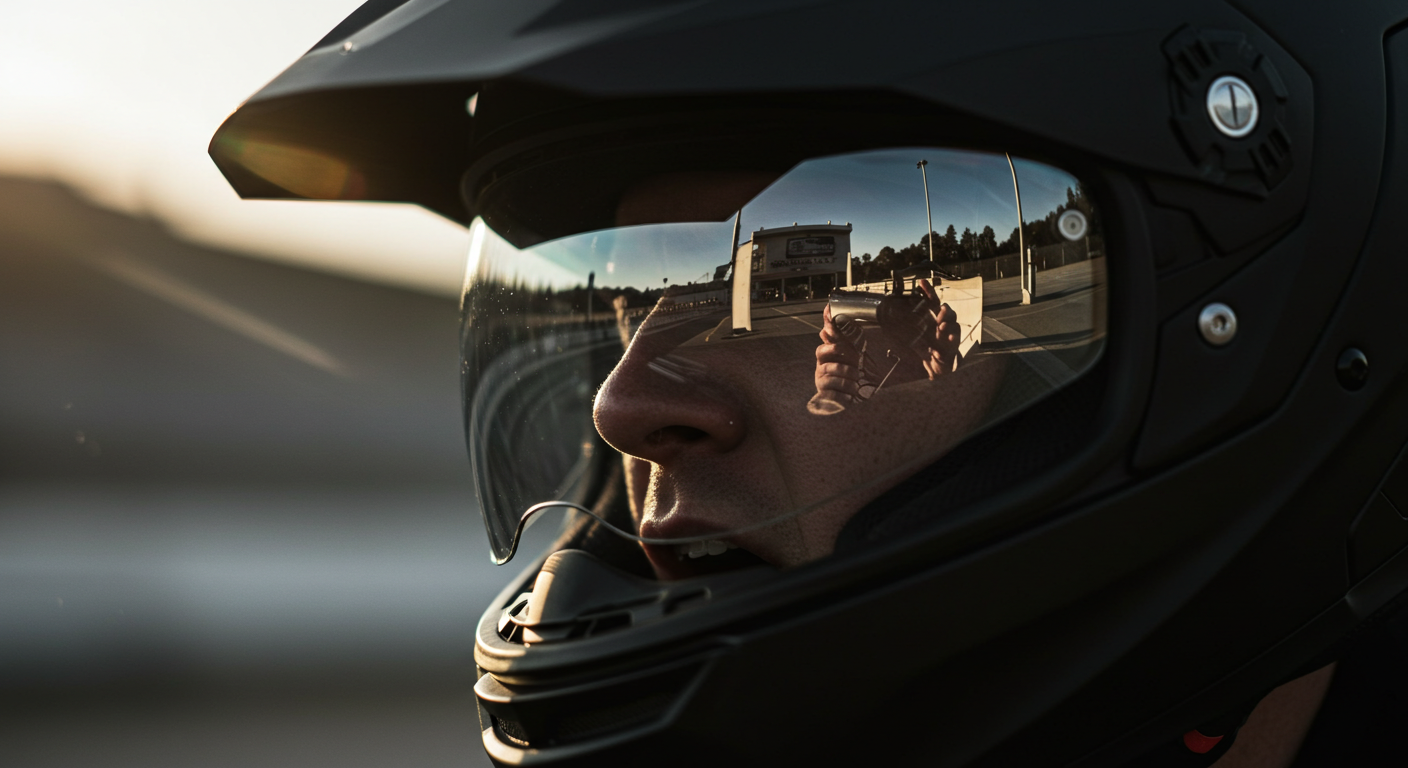Introduction: Cursing as Catharsis on the Open Road
It’s a red light. You’re boxed in by traffic. Someone cuts you off, and it happens—No one hears it. But you feel better. Every motorcycle rider has experienced those moments when the only thing keeping them sane is a string of colourful language inside their helmet. It’s not about aggression—it’s about motorcycle rider emotions. About staying human in a high-stakes, high-focus environment.
This article dives into why we swear in our helmets, how it reflects real riding experiences, and why it’s the unofficial emotional language of two-wheeled travel.

Chapter 1: The Emotional Landscape of Riding
Motorcycling is far more than a hobby—it’s an emotional experience:
- Freedom of the open road
- Frustration with traffic
- Adrenaline when narrowly avoiding danger
- Peace during solo cruises
- Joy during twisty corners
And sometimes, all of that in the span of a few minutes. So, it makes sense that emotions spill over.
Motorcycle Rider Emotions in Action
- Swearing after a close call
- Laughing mid-ride out of sheer joy
- Muttering to yourself in traffic
No one’s listening. But it matters.
Chapter 2: Swearing as a Stress Release
Studies show that swearing actually helps reduce pain and anxiety. It activates your body’s natural stress-relief response. For motorcycle riders, that’s invaluable.
Why Riders Swear:
- Someone merged into your lane without a signal
- You hit an unexpected pothole
- That moment you think “this is it,” but it wasn’t
These aren’t just bad moments—they’re emotional checkpoints. Letting off steam keeps your focus sharp and your emotions balanced.
Chapter 3: Shared but Silent—A Universal Biker Language
Every culture, every language, every rider—swearing is oddly universal. You’ve never met that rider in front of you, but you know when they yell. The body language says it all: hands raised, helmet nodding furiously, bike jerking in frustration. We don’t have helmet-to-helmet comms with strangers, but we understand each other.
Real Motorcycle Rider Emotions Shared Silently
- Road rage doesn’t need translation
- Panic looks the same in every visor
- Relief often ends with a soft chuckle and a whispered “holy ”
Chapter 4: The Link Between Gear and Emotional Control
What you wear affects how you feel. If you don’t trust your gloves, your jacket, or your helmet, you ride with fear.
At GHC Sportswear, we design gear for riders who want confidence, control, and comfort. The right gear helps you manage those emotional spikes.
Real Gear = Real Control
- Confidence in your protection
- Comfort that reduces irritability
- Quiet visors that let you process
Your gear won’t stop you from swearing—but it might help you swear less.
Chapter 5: The Swearing Spectrum—Not All Riders Are the Same
Some riders yell, Some curse under their breath, Some stay silent but talk to their bike like it’s a co-pilot.
Meet the Riders:
- Jake, 24, Loud and Proud: “I treat my helmet like a therapy booth.”
- Linda, 42, Internal Screamer: “My lips don’t move, but my blood boils.”
- Martin, 31, Bike Whisperer: “I don’t swear—I plead with the bike. It usually listens.”
Whatever your style, it’s all about motorcycle rider emotions.
Chapter 6: When Helmet Swearing Saves You
Yes, really. Swearing increases pain tolerance and adrenaline. If you go down, shouting might actually help you stay conscious. That burst of anger or panic can also keep you alert in critical moments.
Survival Emotion:
- After a skid
- In high wind
- On ice or gravel
That primal outburst? It’s part of your brain’s emergency system.
Chapter 7: Emotional Intelligence on Two Wheels
It’s not about being angry—it’s about being aware.
Helmet swearing is a sign you’re emotionally engaged, which is better than riding numb or distracted.
Emotional Riding Tips:
- Acknowledge your frustration
- Let it out (safely)
- Refocus immediately
- Reflect after the ride
Emotions are tools, not enemies. Learn how to use them.
Chapter 8: From Isolation to Connection
Even though you ride solo, you’re never alone. Thousands of riders across the globe are muttering the exact same curse words at roundabouts, potholes, and rainstorms.
Community Connection:
- Online forums full of “helmet confessions”
- Stories shared at cafés about near misses
- Nods exchanged after the same traffic battle
Motorcycle rider emotions connect us more than we admit.
Chapter 9: Turning Motorcycle Rider Emotions Into Advocacy
Real riders know that venting in the helmet isn’t just therapy—it’s insight.
If you find yourself cursing about:
- Dangerous roads
- Poor driver behaviour
- Unsafe gear
channel that into action:
- Join riding groups
- Give feedback to gear makers (like us)
- Post awareness content
Your voice can protect the next rider.
Final Thoughts: Swearing Isn’t Weakness, It’s Proof You’re Alive
No one rides perfectly. But if you’re emotionally invested—if you’re screaming, muttering, praying inside that helmet—it means you care. You’re in it. Fully.Motorcycle rider emotions are real, raw, and worth acknowledging.So go ahead, curse the wind. Shout at the traffic. Laugh at your own mistakes. Just make sure your gear can handle the ride—and your soul can handle the silence after the storm.
